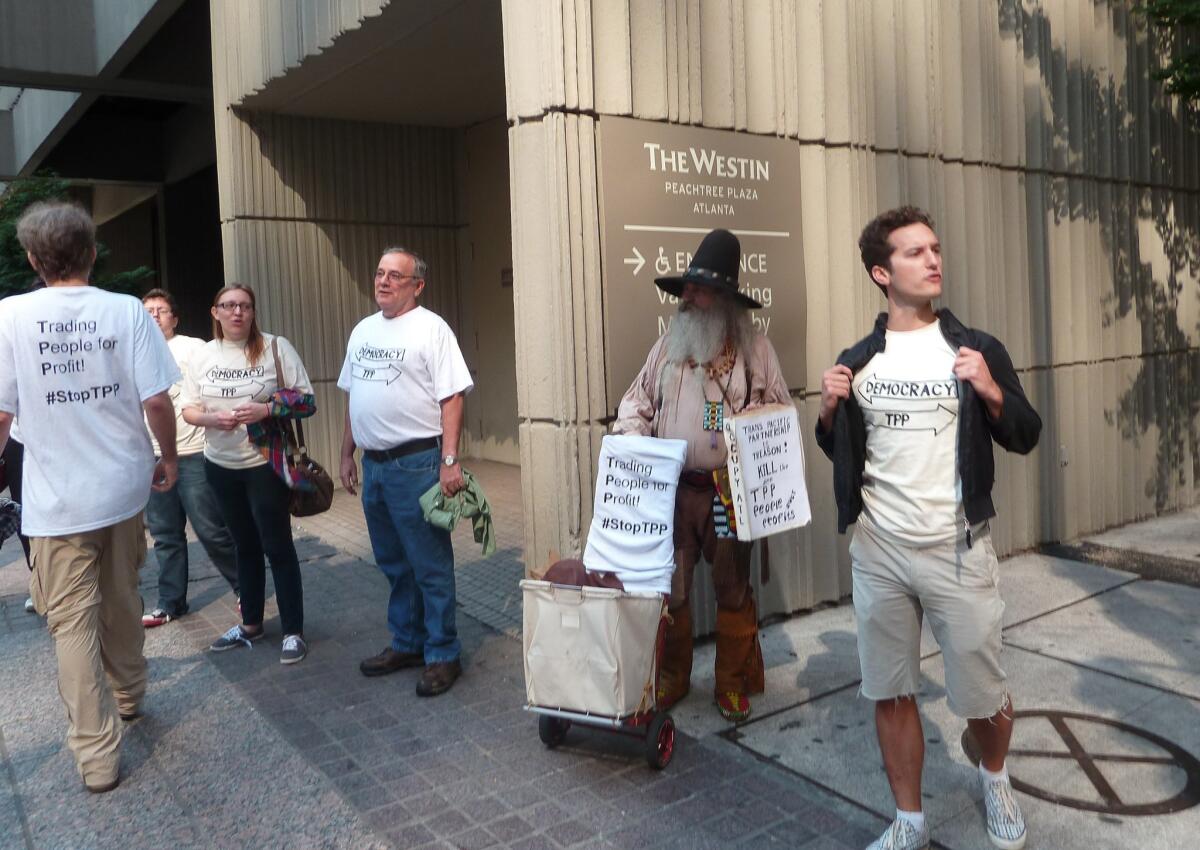Stalled over drug patents, Pacific trade pact negotiators may work all night

People demonstrate outside the Westin Peachtree Plaza Hotel in Atlanta, where trade ministers from the U.S., Japan and 10 other Pacific Rim countries are trying to negotiate a final agreement on the Trans-Pacific Partnership trade agreement.
Reporting from Washington — Officials negotiating an expansive 12-nation Pacific trade accord were gearing up to talk through the night Saturday and possibly into Sunday in a desperate attempt to break a stalemate over drug patents and reach a final deal on the long-elusive agreement.
Since high-level talks on the Trans-Pacific Partnership began Wednesday in Atlanta, officials from the U.S., Japan, Canada and nine other trading partners appear to have made significant headway in overcoming two of three big obstacles that have stood in the way of the biggest free-trade deal in a generation.
SIGN UP for the free California Inc. business newsletter >>
Reports from Atlanta indicated that trade officials have come to terms on certain rules involving the foreign content of autos and auto parts. And industry sources said they saw a compromise on market access for dairy goods, which are highly protected in Canada and other countries.
But there were still sharp differences over patent lengths for certain complex drugs known as biologics. U.S. trade officials, under pressure from the powerful pharmaceutical industry, are said to be seeking a standard of eight years of intellectual property protection for these drugs before generic substitutes can be made.
Most of the dozen Trans-Pacific Partnership countries provide for five or fewer years of such protection, and negotiators from Australia, Chile and some other countries have been reluctant to extend patent terms that many fear could could delay patient access to cheaper imitation drugs and also strain government health budgets. Protests in Atlanta have largely focused on this issue.
People monitoring the talks in Atlanta said a news conference that had been scheduled for Saturday afternoon was postponed. Japan’s chief trade official, Akira Amari, said Saturday that he agreed to a U.S. request to stay in Atlanta for an additional 24 hours, according to Reuters.
“I said there were two conditions for us to accept that proposal: First, this would be the last chance, in other words there had to be certainty of getting a deal on pharmaceuticals; second, because of the schedule, Japan could not accept any further extension,” Amari told reporters.
Peter Maybarduk, Public Citizen’s program director for global access to medicines, who has been closely following the talks in Atlanta, said Saturday evening: ‘’U.S. and Big Pharma may have to cave to other countries.’’
Negotiators had initially scheduled talks through Thursday, and many were hopeful that the parties would reach a deal after an embarrassing failure two months ago in Hawaii.
NEWSLETTER: Get the day’s top headlines from Times Editor Davan Maharaj >>
The Trans-Pacific Partnership is an ambitious effort to link closely 12 nations that make up 40% of the world economy. The U.S. joined the talks in 2008, and since then there have been multiple rounds of negotiations involving hundreds of tariff items and rules on various aspects of trade and investment, including labor, state-owned enterprises, e-commerce and the environment.
President Obama has made the Pacific trade accord a top priority, a key element in his strategy to reorient American foreign policy toward the Asia-Pacific region. The White House said Obama on Thursday talked with Australia’s new prime minister, Malcolm Turnbull, about the Trans-Pacific Partnership, or TPP.
“The two leaders reaffirmed their commitment to concluding TPP soon,” the White House said in a statement.
Follow me on Twitter at @dleelatimes.
ALSO
New bear market threat forces the issue: How much can you stand to lose?
Theme park building boom hits the skids in smaller Chinese markets
Personal finance Q&A: Rethink plan to add debt near retirement
More to Read
Inside the business of entertainment
The Wide Shot brings you news, analysis and insights on everything from streaming wars to production — and what it all means for the future.
You may occasionally receive promotional content from the Los Angeles Times.











